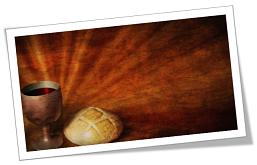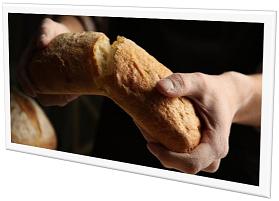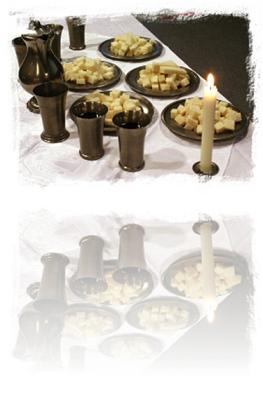The Confession of Faith Article 35 Of the Holy Supper of Our Lord Jesus Christ
The Confession of Faith Article 35 Of the Holy Supper of Our Lord Jesus Christ
After the article regarding holy baptism, our confession proceeds to the sacrament of the Lord's Supper. Baptism is the sacrament of incorporation in the Christian church, while the Lord's Supper is given for the support of spiritual life. This unity between the sacraments is also described in this article, where it reads, "We believe and confess, that our Savior Jesus Christ did ordain and institute the sacrament of the holy supper, to nourish and support those whom He hath already regenerated, and incorporated into His family, which is His Church." The same relationship exists between baptism and the Lord's Supper as existed between circumcision and the Passover.
The Passover supposes circumcision, as is evident from Exodus 12:48, "Let all his males be circumcised, and then let him come near and keep it." The Passover had an historical meaning, namely the deliverance of Israel, but also a spiritual meaning, as we will find explained in the New Testament. Christ Himself is called the Lamb and the Paschal Lamb (see John 1:29 and 1 Corinthians 5:7). The similarity between the Paschal lamb and Christ is so clear that in the New Testament Christ is portrayed as the Lamb. Did not Isaiah do the same? He wrote, "He is brought as a lamb to the slaughter."
In Christ we find the fulfillment of the Passover sacrifice. The believing Israelite under the Old Testament looked by faith through this sacrifice at Christ Who would come. The Lord Jesus Himself brought this relationship to the foreground when He instituted the Lord's Supper. He could have instituted it at another time, since they ate together each day and the cup then also went from the one to the other. However, it was not at one of these meals, but at the Passover that the Lord instituted the holy supper. It was also a prophecy of that which would take place at Golgotha.
The Holy Supper is also a spiritual meal by which is commemorated the deliverance out of the house of bondage by the blood which is poured out for us. It is a deliverance from the satanic Pharaoh by the blood of the Lamb of God, which taketh away the sin of the world. In the Lord's Supper God's people are strengthened by the crucified body and shed blood of Christ.
Holy baptism is the sacrament of incorporation or birth, whereas the Holy Supper was instituted in the first place to the commemoration of Christ's death, but was also given for the strengthening of faith. In a beautiful though simple way this is described by our fathers in the confession, "Now those, who are regenerated, have in them a twofold life, the one corporal and temporal, which they have from their first birth, and is common to all men: the other spiritual and heavenly, which is given them in their second birth, which is effected by the word of the gospel, in the communion of the body of Christ; and this life is not common, but is peculiar to God's elect."
In this part our confession describes the believers as children who are brought by God into His family, which is the church, where He also nourishes them. The Holy Supper is not a means to work faith, but it is given to strengthen the faith which has been worked, the faith which is present. Faith is worked by the Word under the administration of the Holy Ghost. Just as creation took place by the Word, so likewise does recreation. It is incomprehensible for us that the world was created by the Word only, and so it is also in regeneration. We know only that the Holy Spirit binds Himself powerfully to the Word to work irresistibly in the hearts of the elect.
That which is visible in the administration of grace is entrusted to men, but the distribution of the invisible the Lord has reserved for Himself. The heart of the elect is prepared by the Spirit to receive the seed of the Word, which will bring forth fruit in faith and in conversion. When faith has been worked, it has to be continually strengthened. Just as the seed in the ground needs air, rain and sunshine, so the spiritual seed in the believer needs protection, but also nourishing. Strengthening of faith is given by the Lord in the preaching of the Word, but He has also especially given the Lord's Supper for this.
The confession states, "In like manner God has given us, for the support of the bodily and earthly life, earthly and common bread, which is subservient thereto, and is common to all men, even as life itself. But for the support of the spiritual and heavenly life, which believers have, He hath sent a living bread, which descended from heaven, namely, Jesus Christ, Who nourishes and strengthens the spiritual life of believers, when they eat Him, that is to say, when they apply and receive Him by faith in the spirit."
 The Lord's Supper is a meal whereof the Lord Jesus is not only the Institutor, but is also the Host and Administrator, while the true believers are His guests. The institution of this sacrament is described in many places of God's Word. The fact that it is a Divine institution is of the greatest importance, since without being so it would not be a sacrament at all, but at the most a moving ceremony. The sacraments are signs and seals instituted by God. Paul told how the Lord had given him a special revelation that Christ had instituted this sacrament and that it would be in force, until the end of the world.
The Lord's Supper is a meal whereof the Lord Jesus is not only the Institutor, but is also the Host and Administrator, while the true believers are His guests. The institution of this sacrament is described in many places of God's Word. The fact that it is a Divine institution is of the greatest importance, since without being so it would not be a sacrament at all, but at the most a moving ceremony. The sacraments are signs and seals instituted by God. Paul told how the Lord had given him a special revelation that Christ had instituted this sacrament and that it would be in force, until the end of the world.
How was it instituted? First, the Lord had taken the bread and the cup, which showed His willingness to die. Secondly, He gave thanks for the bread and the cup, whereby He made the bread and wine the signs of His body and blood. In the third place, He brake the bread, and later gave it and also the wine to the disciples to eat and drink. He gave the command to take, to eat and to drink; after this He gave a promise and an explanation, namely, this is My body, which is broken for you, and this is My blood which is shed for you. He also gave a mission for the future, This do in remembrance of Me!
The Lord nourishes and strengthens the spiritual life of the believers when they eat and drink Him, that is to say, when they apply and receive Him by faith in the spirit. As natural bread is not only for adults, but also for children, so likewise the Lord's Supper is for the assured church, but also for those who have a weak faith. Therefore we read in the catechism that the holy Ghost works faith in our hearts by the preaching of the gospel and confirms it by the use of the sacraments. Here again it is emphasized that we must have faith in order to come to the Lord's table.
Young people, I hope that the Lord may teach us our misery first. For many conversion begins with the Lord's table, but this is not scriptural. Ask for a conversion as it has always been in the past and that we may not deceive ourselves for that great eternity.
We all know that the signs in the Lord's Supper are bread and wine. These signs were not taken by Christ arbitrarily, but intentionally because of the striking similarity between bread and wine in daily life and the flesh and blood of Christ in the life of grace. This is also spoken of in this 35th article, where we read, "…He hath sent a living bread, which descended from heaven, namely, Jesus Christ, Who nourishes and strengthens the spiritual life of believers, when they eat Him, that is to say, when they apply and receive Him by faith in the spirit."
Then an explanation is given of the relationship of the sign and the thing signified, the relationship between bread and wine and the body and blood of Christ. A right insight in this relationship is of the greatest importance, since the interpretation of it is so different in the various churches. The churches of the reformation have always taught that the bread and wine do not change into the body and blood of Christ when the sacrament is administered, but are signs and seals of Christ's crucified body and shed blood. With the hand of faith He is received and with the mouth of faith we eat and drink Him, but it is in a spiritual way. Something of this communion can also be experienced outside of the Lord's Supper, but this sacrament was specially given for this purpose.
How this communion is possible and how it is to be explained, we do not know, just as our article states, "the manner surpasses our understanding and cannot be comprehended by us, as the operations of the Holy Ghost are hidden and incomprehensible." This is not a corporal communion, since in His human nature Christ is in heaven until the end of the world, but this communion is experienced through the Holy Spirit.
Not everyone who takes part in the Communion receives a blessing, but only true believers when they may come in an upright frame. The unbeliever cannot receive this blessing because he does not have a spiritual hand and mouth of faith. He receives the sign, but not that which is signified. This is given only to God's people; for them Christ is the living bread which descended from heaven. He has promised, "Whoso eateth My flesh, and drinketh My blood, bath eternal life" (John 6:51, 54). When they may take part in the Lord's Supper with a believing heart, they are reminded of the sacrifice of the Mediator, Who paid for the church. As they see the bread broken and the wine poured out, then they think of the night in which the Lord was betrayed and gave Himself willingly to save a lost people. In the Supper they may see the inexpressible love of Christ for His Church, and His care as a shepherd in giving this sign and seal to the church militant to strengthen them in their faith.
This sacrament also shows the great love of God the Father, Who has given His only begotten Son to go in this deep way of humiliation. Neither can the powerful work of the Holy Ghost be denied; by nature we are enemies of God and of His grace, yes, even of our own salvation. But under the administration of the Spirit we are born again, which gives not only a fleeing from sin, but also a seeking after God, as a result of the true sorrow that was born. The Spirit leads to Christ, Who is richly preached and portrayed in the Lord's Supper.
Thus the churches of the Reformation believe and confess that the presence of Christ in the sacrament commemorating His death is a spiritual presence. This contradicts the doctrine of Rome and of Luther, who both teach a personal presence of Christ in the sacrament. They are not mentioned by name in this article, but their doctrines are condemned. Since this is well known to all of us, we will not pursue it further.
"Further, though the sacraments are connected with the things signified, nevertheless both are not received by all men: the ungodly indeed receives the sacrament to his condemnation, but he doth not receive the truth of the sacrament." Christ instituted the sacrament for adults and not for members under age, because they cannot discern the Lord's body. The Lord's Supper was not instituted to quicken the dead sinner, but to feed and strengthen the faith of the regenerated.
 People who live an unholy life must be excluded from the Lord's table. For this the church received of the Lord two keys, namely, the preaching of the Gospel and Christian discipline, or the censure. If we live outwardly blameless and have a church right, no one can refuse us permission to come to the Lord's table. However, such a coming is not in the favor of the Lord, for He asks for truth within, for a Divine right. Augustine said of Judas, who probably also took part in the newly instituted sacrament, "The other disciples have eaten the bread Christ, Judas only the bread of Christ."
People who live an unholy life must be excluded from the Lord's table. For this the church received of the Lord two keys, namely, the preaching of the Gospel and Christian discipline, or the censure. If we live outwardly blameless and have a church right, no one can refuse us permission to come to the Lord's table. However, such a coming is not in the favor of the Lord, for He asks for truth within, for a Divine right. Augustine said of Judas, who probably also took part in the newly instituted sacrament, "The other disciples have eaten the bread Christ, Judas only the bread of Christ."
Therefore according to the command of Christ, self-examination or the preparatory service must be held, wherein the difference between the true and the temporal believer is to be preached. This is a very difficult task. How necessary is the guidance of the Lord Himself, since the unbeliever so easily makes a ground of that which is no foundation, but God's children also are so often frightened when the explanation is given as to how far it can go in the life of man and still not be true.
Many times we are surprised when we see those of other churches so at ease with their outwardly good life or resting on their baptismal covenant relationship. You cannot understand how it is possible that they swallow all that deceit, which is so unscriptural! O, it is so easy to speak about others, but more shocking it is that we, who claim to have the truth, are just as much at ease and do not seem to concern ourselves about eternity at all. In many congregations we find a spirit of deep sleep, but we also find those who are so satisfied with their walk and life, thinking it is well based only on these outward things.
Young people, we are happy when you are interested in speaking about and examining God's Word, but do not build up each other, because that is such a great danger in the days in which we live. We hope that the Lord works among our young people, and we do know that some of you have questions about it. When it is really a need in our life worked from on high, the Lord will also give an answer from on high at His time. Ask the Lord that He not permit you to walk ahead of Him, but that the leading of the Spirit may be given to you, also in respect to the Lord's Supper. It is such a great gift for the Church, for the true believers. It will not do any good, but rather harm, when we go in our own strength to take the bread of the children.
Most happy we would be if the work of the Lord became evident also among our young friends, because Jacob is becoming so very low, so that we must many times fear for the future, even though we know that the Lord reigns.
Jehovah reigns as King,
To Him all homage bring;
Ye islands, earth, and ocean,
Break forth in glad devotion.

Add new comment